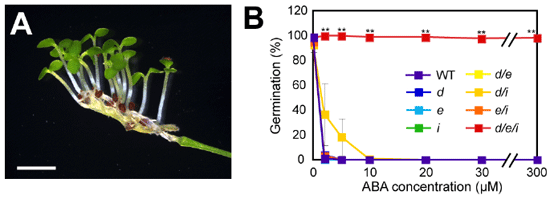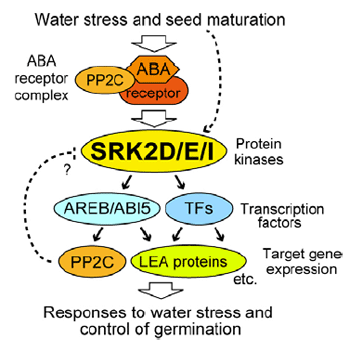SnRK2 protein kinases are essential for the control of drought tolerance and germination
Description
Plants are inevitably confronted during their life cycle with numerous environmentally determined stresses such as drought that can be detrimental to their survival. Abscisic acid (ABA) is an important phytohormone regulating various plant processes, including drought tolerance, seed development, and germination. We aim to elucidate the molecular mechanism of ABA-mediated drought tolerance, seed development, and germination. SRK2D/SnRK2.2, SRK2E/SnRK2.6/OST1 and SRK2I/SnRK2.3 (SRK2D/E/I) are redundant ABA-activated SNF1-related protein kinases 2 (SnRK2s) in Arabidopsis thaliana. In this study, we examined the role of these protein kinases in drought tolerance, seed development, and germination.
Expression analysis showed that SRK2D and SRK2I were expressed in leaf and root tissues, whereas SRK2E was expressed strongly in the guard cells of leaves. We assessed the effect of srk2d, srk2e, and srk2i mutations on drought tolerance. After reducing the relative humidity (RH) from 95 to 60 ± 5%, unlike srk2d, srk2e, and srk2i single and double mutants, srk2d srk2e srk2i (srk2d/e/i)triple mutant plants drastically withered and collapsed within 30 minutes.
In the drought tolerance test, our results showed that unlike the single and double mutants, the srk2d/e/i triple mutants exhibited greatly reduced tolerance to drought-stress (Fig. 1A). These findings are consistent with the increased rate of water loss observed in the srk2d/e/i triple mutant, compared with other mutants and wild-type (WT) plants (Fig. 1B). The triple mutant was also sensitive to desiccation. Siliques of the srk2d/e/i mutant plants contained viviparous seeds when grown in high humidity conditions (95 ± 5% RH; Fig. 2A).
In contrast to the other mutant and WT plants, green cotyledons were observed three days after stratification in all srk2d/e/i mutant seedlings grown on agar plates containing various concentrations of ABA (0~300 µM). In the vegetative growth stage, the seedling growth of srk2d/e/i triple mutant plants was strongly ABA-insensitive.
These results suggest that the triple mutant is highly insensitive to ABA. Under water-stress conditions and seed maturation stage, ABA- and water stress-dependent gene expressions, including those of transcription factors, were globally and drastically impaired in srk2d/e/i triple mutants, but not in other single and double mutants. Expression of dehydration-responsive late embryogenesis abundant (LEA) protein genes and ABA-related 2C-type protein phosphatase (PP2C) genes were strongly repressed in the srk2d/e/i triple mutants. Together, our results indicate that SRK2D/E/I function as the main positive regulators for the control of drought tolerance and germination (Fig. 3).
These results likewise suggest that manipulation of gene expression or function of SnRK2 protein kinases might be effective for the improvement of drought tolerance and the control of germination.
Figure, table
-
Fig. 1. Growth and drought-tolerant phenotypes of srk2d, srk2e and srk2i single mutants and all combinations of multiple mutants
: (A) Photographs of plants before and after stress treatment. Watering was withheld from 3-week-old plants for seven days, then plants were rewatered for five days before the photograph was taken. (B) Rates of water loss from 4-week- old plants at 25 ºC and 20 % RH. -
Fig. 2. Extreme ABA-insensitivity of srk2d/e/i triple mutant plants.
(A) Viviparous seeds in attached siliques of srk2d/e/i mutant grown at high humidity (95 ± 5% RH). Scale bar = 2 mm. (B) Dose-response of germination to ABA. Seeds were germinated on agar plates containing various concentrations of ABA and 1% sucrose, and seedlings with green cotyledons were counted after three days. Germination curves of mutants except srk2d/i and srk2d/e/i overlap with that of WT. -
Fig. 3. Model for SRK2D/E/I regulation of ABA signaling in response to water stress and seed maturation
: In response to water stress, ABA appears to trigger activation of SRK2D/E/I via the ABA receptor complex. Then, SRK2D/E/I positively regulates downstream genes such as PP2Cs and LEA protein genes via transcription factors (TFs) which include AREB/ABI5. Consequently, PP2Cs are assumed to bind to the SRK2D/E/I to fine-tune ABA signaling in response to water stress.
- Affiliation
-
Japan International Research Center for Agricultural Sciences Biological Resources Division
- Classification
-
Administration B
- Term of research
-
FY2009 (FY2006~2011)
- Responsible researcher
-
NAKASHIMA Kazuo ( Biological Resources Division )
FUJITA Yasunari ( Biological Resources Division )
YAMAGUCHI-SHINOZAKI Kazuko ( Biological Resources Division )
- ほか
- Publication, etc.
-
Nakashima et al. (2009) Plant Cell Physiol. 50:1345-1363
Fujita et al. (2009) Plant Cell Physiol. 50: 2123-2132
- Japanese PDF
-
2009_seikajouhou_A4_ja_Part8.pdf71.17 KB



